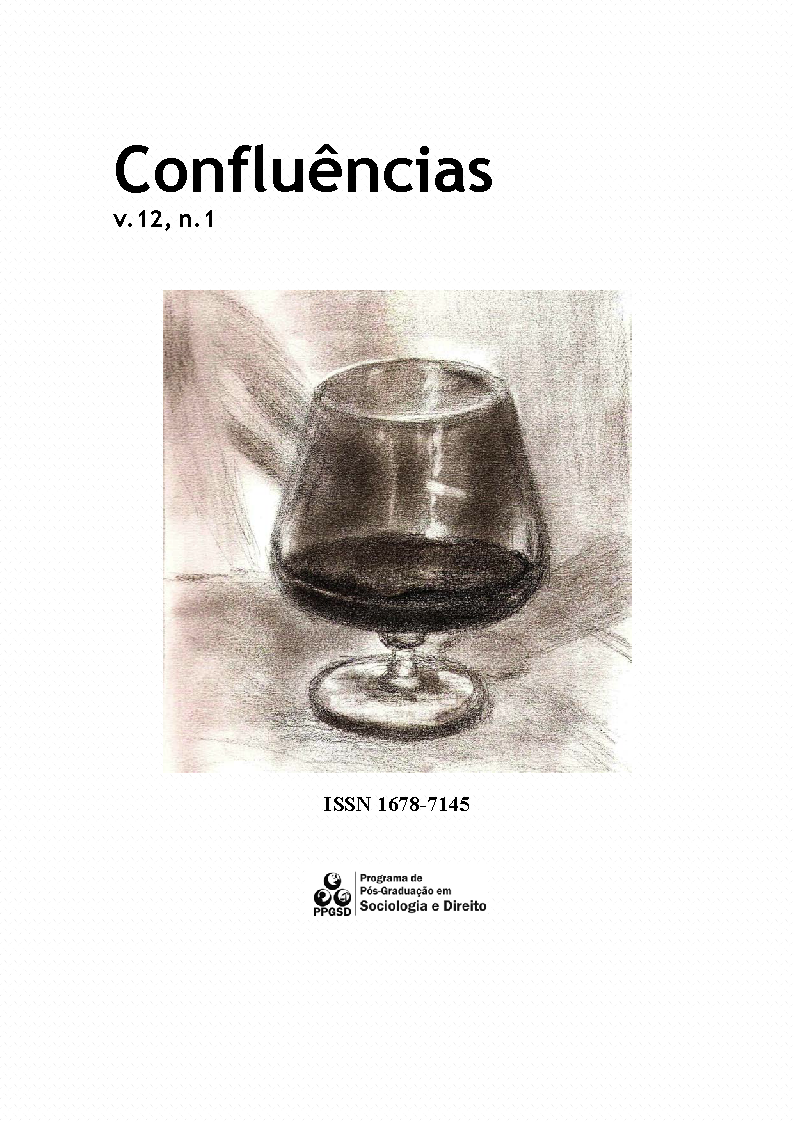O ESTADO, SEGUNDO O DIREITO INTERNACIONAL
DOI:
https://doi.org/10.22409/conflu12i1.p253Palavras-chave:
Sucessão de Estados, analogia doméstica, estado de natureza.Resumo
Este artigo propõe-se a traçar um programa de estudos para trabalhos futuros; nele, procura-se fornecer subsídios para uma espécie de “Teoria Geral do Estado” que leve em consideração não apenas o direito constitucional e/ou a situação jurídica-política interna, mas também o direito internacional. Como regra, os estudos tradicionais deste porte consideram o Estado o pináculo do engenho humano e, assim, ou as suas análises detêm-se dentro das fronteiras nacionais, ou elas aceitam a idéia de que, além destes limites, não pode haver Direito. Estudar o Estado, segundo o direito internacional, tornar-se-ia irrelevante uma vez que as relações internacionais não poderiam engendrar uma ordem jurídica em sentido próprio, porque as nações estariam num verdadeiro estado de natureza. Contudo, estas duas posturas – a que, por comodidade, não avança a análise além das fronteiras nacionais, e a que opta por isso, de maneira consciente – revelam-se equivocadas. Primeiro, o direito internacional pode contribuir bastante para a revisão da clássica tese dos três elementos do Estado, como sugerem recentes casos de sucessão de Estados, e, segundo, negar a juridicidade do direito internacional significa supor que o Direito não pode florescer sem o Estado.Downloads
Referências
AUSTIN, John. The Province of Jurisprudence Determined. 2. ed. London: John Murray, 1861. pp. 1-4. Disponível em <http://www.book.google.com>. Acesso em maio de 2008.
BETTATI, Mario. Le Droit d’Ingérence: mutation de l’ordre international. Paris: Odile Jacob, 1996.
BODINO, Juan. Los Seis Libros de la República. Madrid: Aguilar, 1973.
BORGES DE MACEDO, Ubiratan. Metamorfoses da Liberdade. São Paulo: IBRASA, 1978.
CONVENÇÃO SOBRE DIREITOS E DEVERES DOS ESTADOS. Assinada em Montevidéu, em 26/12/1933 e promulgada pelo Dec. 1570 de 13/04/1937. Disponível em
. Acesso em maio de 2008.
CORTE INTERNACIONAL DE JUSTIÇA. Advisory Opinion of 21 June 1971. Legal Consequences for States of the Continued Presence of South Africa in Namibia (South West Africa) Notwithstanding Security Council Resolution276 (1970). Disponível em . Acesso em maio de 2008.
INTERNATIONAL COMMISSION ON INTERVENTION AND STATE SOVEREIGNTY (ICISS) The Responsibility to Protect: Report of the Commission on Intervention and State Sovereignty. Ottawa: International Development Research Centre, dezembro 2001. Disponível em <http://www.iciss-ciise.gc.ca>. Acesso em fevereiro 2006.
HOBBES, Thomas. Leviatã. Trad. João Paulo Monteiro e Maria Beatriz Nizza da Silva. 2. ed. São Paulo: Abril Cultural, 1979.
HOBBES, Thomas. Do Cidadão. Trad. Renato Janine Ribeiro. São Paulo: Martins Fontes, 2002.
KELSEN, Hans. Les rapports de système entre le droit interne et le droit international public. Recueil de Cours de L’Académie de Droit International, tomo 14, 1926.
KELSEN, Hans. Teoria Geral do Direito e do Estado. Trad. Luís Carlos Borges. São Paulo: Martins Fontes, 1990.
KELSEN, Hans. Teoria Pura do Direito. Trad. Luís Carlos Borges. 6. ed. São Paulo: Martins Fontes, 1998.
KOHEN, Marcelo. Création d’Etats en droit international contemporain. Cours EuroMéditerranéens Bancaja de droit nternational, v. VI, 2002, pp.546-635.
OPINIONS OF THE ARBITRATION COMMITTEE FOR OUGOSLAVIA. Disponível em <http://www.ejil.org/journal/Vol3/No1/art13.html>. Acesso em maio de 2008.
ORGANIZAÇÃO DOS ESTADOS AMERICANOS. Carta da Organização dos Estados Americanos. Disponível no sítio oficial da OEA: <http://www.oas.org>. Acesso em maio de 2008.
TRIEPEL, Carl H. Les Rapports entre le Droit Interne et le Droit International. Recueil de Cours de L’Académie de Droit International, tomo I, 1925.
VIRALLY, Michel. El devenir del derecho internacional. México: Fondo de Cultura Económica, 1997.
Downloads
Publicado
Edição
Seção
Licença
Os autores mantêm os direitos autorais e concedem à revista o direito de primeira publicação, com o trabalho simultaneamente licenciado sob a Licença Creative Commons Attribution que permite o compartilhamento do trabalho com reconhecimento da autoria e publicação inicial nesta revista. Têm autorização para assumir contratos adicionais separadamente, para distribuição não-exclusiva da versão do trabalho publicada nesta revista (ex.: publicar em repositório institucional ou como capítulo de livro), com reconhecimento de autoria e publicação inicial nesta revista. Possuem permissão e são estimulados a publicar e distribuir seu trabalho online (ex.: em repositórios institucionais ou na sua página pessoal) a qualquer ponto antes ou durante o processo editorial, já que isso pode gerar alterações produtivas, bem como aumentar o impacto e a citação do trabalho publicado.







